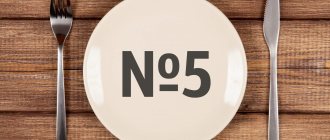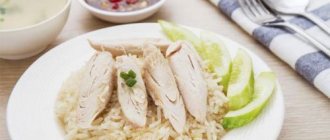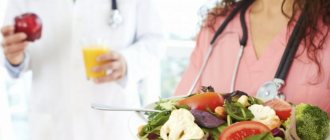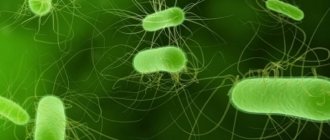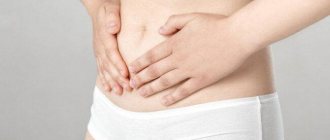Baby vomiting is usually very scary for parents. In most cases, there is nothing to be afraid of; vomiting is a mechanism developed by the body to protect itself from the introduction of toxic substances through the walls of the stomach and intestines. It can be one-time, or it can be repeated several times. In any case, even with minor such manifestations, you need to show the child to a specialist who will examine him, prescribe treatment, and give advice on what to feed the child after vomiting.
Possible causes of vomiting in children
After vomiting, the main thing is to drink!
If the child’s condition does not cause concern, and the vomiting was not gushing, but one-time and not very strong, you can try to stabilize his condition on your own. Possible causes of childhood vomiting may include:
- Head injury. This life-threatening condition may be accompanied by fainting.
- Brain concussion.
- Food poisoning. Accompanied by high fever and diarrhea.
- Bacterial infection of the stomach and intestines.
- Increased temperature with acute respiratory infections, acute respiratory viral infections.
- Disorders of the gastrointestinal tract (gastritis, peptic ulcer of the duodenum and stomach). Vomit may be streaked with blood. Additionally, abdominal pain appears.
- Pylorospasm in newborns.
- Unusual food, excessive consumption of spices and food additives, sweets.
- Eruption of baby teeth.
It is imperative to find out the cause of vomiting in order to avoid complications. Particular attention is given to infants and newborns and children with chronic diseases. Symptoms such as vomiting with bile and blood, rapid pulse, pale skin, a combination of vomiting and diarrhea, constant drowsiness or excessive overexcitation, breast refusal and severe crying in an infant make one fear serious consequences. In these cases, you should immediately seek emergency medical help.
Advantages and disadvantages
| pros | Minuses |
|
|
Restoring digestion immediately after vomiting
Vomiting is a warning sign!
This unpleasant phenomenon is accompanied by side effects such as disruption of water-salt balance and loss of large amounts of fluid by the body. Before feeding the child, it is necessary to restore this balance, if medical tactics do not provide for other measures. Until these indicators are brought back to normal, feeding may be inappropriate and even harmful to children's health.
It is recommended to replenish lost fluid and additionally take medications containing salt, soda, calcium, and glucose to replenish lost nutrients. These may be medications such as Regidron, Glucosolan, Oralit. Water-salt solutions prepared from them give 1-2 tsp. for babies, older children – 1-2 tbsp. spoons at a time. Required volume:
- Children under one year old – 150-200 ml per kg of weight per day.
- For children over one year old – 120-170 ml per kg of weight.
It is better to drink sweet tea, rosehip infusion, still mineral water, rice water, dried fruit compote. If the child does not show appetite, you can get by with these measures for the next 5-6 hours.
Recommended dishes and diet
Severe vomiting may be a symptom of rotavirus infection
The most important thing is that you don’t have to force feed your baby. Abstaining from food is one of the techniques for speedy rehabilitation of the body after vomiting. The child is offered food every 2-2.5 hours, the total number of meals can be up to 6-7 times. The volume of portions also changes compared to the usual diet; portions become smaller.
After 3-5 days, it is possible to return to the previous amount of food if problems with vomiting no longer occur. A gentle diet and nutrition regimen should be followed for 1-3 weeks after vomiting. Basic dietary requirements for children:
Fully or partially limited products
The diet for vomiting in children prohibits the consumption of any pastries and bakery products, concentrated broths and soups based on them, porridges with coarse cereals (millet, barley, barley), cheeses, fatty fermented milk products, cream and sour cream.
Excluded from the diet: fatty red meats and waterfowl meat, fish, solid animal fats, sausages, canned foods, smoked meats, fast food, processed foods, legumes, marinades, pickles.
The consumption of mushrooms, fresh vegetables, fruits, as well as hot and spicy seasonings and spices, hot sauces, ketchups and mayonnaise, chocolate, and ice cream is not allowed. As for drinks, it is not recommended to consume packaged juices, cola, strong tea and coffee, and carbonated drinks.
Table of prohibited products
| Proteins, g | Fats, g | Carbohydrates, g | Calories, kcal | |
Vegetables and greens | ||||
| spicy vegetables | 2,8 | 0,5 | 5,3 | 36 |
| vegetables legumes | 9,1 | 1,6 | 27,0 | 168 |
| canned vegetables | 1,5 | 0,2 | 5,5 | 30 |
| swede | 1,2 | 0,1 | 7,7 | 37 |
| cabbage | 1,8 | 0,1 | 4,7 | 27 |
| sauerkraut | 1,8 | 0,1 | 4,4 | 19 |
| cauliflower | 2,5 | 0,3 | 5,4 | 30 |
| bulb onions | 1,4 | 0,0 | 10,4 | 41 |
| cucumbers | 0,8 | 0,1 | 2,8 | 15 |
| canned cucumbers | 2,8 | 0,0 | 1,3 | 16 |
| pickles | 0,8 | 0,1 | 1,7 | 11 |
| radish | 1,2 | 0,1 | 3,4 | 19 |
| white radish | 1,4 | 0,0 | 4,1 | 21 |
| turnip | 1,5 | 0,1 | 6,2 | 30 |
| canned tomatoes | 1,1 | 0,1 | 3,5 | 20 |
| garlic | 6,5 | 0,5 | 29,9 | 143 |
Fruits | ||||
| pears | 0,4 | 0,3 | 10,9 | 42 |
Berries | ||||
| grape | 0,6 | 0,2 | 16,8 | 65 |
Mushrooms | ||||
| mushrooms | 3,5 | 2,0 | 2,5 | 30 |
| marinated mushrooms | 2,2 | 0,4 | 0,0 | 20 |
Nuts and dried fruits | ||||
| nuts | 15,0 | 40,0 | 20,0 | 500 |
Cereals and porridges | ||||
| corn grits | 8,3 | 1,2 | 75,0 | 337 |
| pearl barley | 9,3 | 1,1 | 73,7 | 320 |
| Wheat groats | 11,5 | 1,3 | 62,0 | 316 |
| millet cereal | 11,5 | 3,3 | 69,3 | 348 |
| barley grits | 10,4 | 1,3 | 66,3 | 324 |
Flour and pasta | ||||
| pasta | 10,4 | 1,1 | 69,7 | 337 |
Bakery products | ||||
| Old Russian grain bread | 9,6 | 2,7 | 47,1 | 252 |
| Rye bread | 6,6 | 1,2 | 34,2 | 165 |
Confectionery | ||||
| candies | 4,3 | 19,8 | 67,5 | 453 |
| cake | 3,8 | 22,6 | 47,0 | 397 |
Chocolate | ||||
| chocolate | 5,4 | 35,3 | 56,5 | 544 |
Raw materials and seasonings | ||||
| ketchup | 1,8 | 1,0 | 22,2 | 93 |
| mayonnaise | 2,4 | 67,0 | 3,9 | 627 |
| soy sauce | 3,5 | 0,0 | 11,0 | 58 |
| vinegar | 0,0 | 0,0 | 5,0 | 20 |
Dairy | ||||
| milk 4.5% | 3,1 | 4,5 | 4,7 | 72 |
| cream | 2,8 | 20,0 | 3,7 | 205 |
Meat products | ||||
| pork | 16,0 | 21,6 | 0,0 | 259 |
Sausages | ||||
| dry-cured sausage | 24,1 | 38,3 | 1,0 | 455 |
Bird | ||||
| smoked chicken | 27,5 | 8,2 | 0,0 | 184 |
| duck | 16,5 | 61,2 | 0,0 | 346 |
| smoked duck | 19,0 | 28,4 | 0,0 | 337 |
| goose | 16,1 | 33,3 | 0,0 | 364 |
Fish and seafood | ||||
| dried fish | 17,5 | 4,6 | 0,0 | 139 |
| smoked fish | 26,8 | 9,9 | 0,0 | 196 |
| canned fish | 17,5 | 2,0 | 0,0 | 88 |
Oils and fats | ||||
| animal fat | 0,0 | 99,7 | 0,0 | 897 |
| cooking fat | 0,0 | 99,7 | 0,0 | 897 |
Non-alcoholic drinks | ||||
| cola | 0,0 | 0,0 | 10,4 | 42 |
| lemonade | 0,0 | 0,0 | 6,4 | 26 |
| Pepsi | 0,0 | 0,0 | 8,7 | 38 |
| black tea | 20,0 | 5,1 | 6,9 | 152 |
Juices and compotes | ||||
| tomato juice | 1,1 | 0,2 | 3,8 | 21 |
| * data is per 100 g of product | ||||
Infant nutrition
Vomiting as a symptom of food poisoning
The best food for infants, and especially for newborns, remains mother's milk. It perfectly stabilizes the condition of the stomach and intestines in uncomplicated conditions. Children under 6 months of age who are bottle-fed and mixed-fed can receive food that is familiar to them, if it does not cause vomiting due to allergies or incompatibility.
Babies over 6 months of age receiving complementary foods can begin restoring nutrition after vomiting buckwheat or rice porridge. They are prepared using a mixture of milk and water in equal quantities.
After 2 days, you can add a few teaspoons of freshly prepared cottage cheese to your diet. Vegetable puree and fruit juice are introduced after 3-4 days very carefully, starting with a small amount.
Foods that stop vomiting
The following products will help overcome nausea and recover from vomiting:
- non-acidic natural yogurt, cottage cheese with a fat content of 1-5%;
- boiled eggs;
- dry toast;
- baked apples without peel;
- boiled carrots;
- rice water, liquid porridge (rice, buckwheat, oatmeal);
- mashed starchy vegetables;
- bananas.
Boiled eggs help restore the gastrointestinal tract after vomiting.
The menu for toxicosis in pregnant women has some nuances, since nausea in this case is caused not by irritation of the gastrointestinal tract, but by stimulation of the vomiting center.
If nausea is caused by an exacerbation of a disease of the digestive system, kidneys or liver, then to alleviate the condition you need to adhere to an appropriate therapeutic diet.
Rules for processing and preparing products
Preparing food for children with consequences of vomiting requires special care. Products must be fresh, all dishes are prepared in such a way that they can be eaten immediately. All products are thoroughly washed under running water, cut and cleaned on various cutting boards. Food is served warm; you should not offer your child food from the refrigerator or very hot food.
Dishes are prepared only by steaming or boiling in weak meat broth and water. If vomiting was caused by problems with the gastric mucosa, the products should be crushed with a blender or rubbed through a sieve. The cereal is very overcooked, and for infants, boiled cereal is ground into jelly.
Diet for poisoning
If the vomiting was not prolonged and was limited to several attacks, the diet is maintained for a day or two. A painful condition caused by an intestinal infection or food poisoning requires a weekly dietary regimen. In some cases, gentle food is taken for several weeks - a month.
Vomiting often occurs unexpectedly and the cause is not related to poisoning. Signs of nausea can occur with hyperthermia, due to a viral infection, or overeating with unusual foods. Such vomiting does not require specific therapy. Doctors advise reducing the amount of food you eat and drinking more water. During this period, it is worth listening to the body. After vomiting and diarrhea, you should not eat in the first hours.
Prohibited products
Severe and frequent vomiting is a reason to call a doctor!
It is completely unacceptable to give fried, smoked, or pickled foods to children after vomiting. Fresh wheat bread is replaced with crackers or dried croutons. It is not recommended to feed children after vomiting the following foods:
- Salads from fresh and pickled vegetables.
- Legumes: beans, peas.
- Sweets: chocolate candies, caramel, lollipops, marshmallows, marmalade.
- Dishes made from millet and pearl barley.
- Freshly squeezed juices and juices from sour berries and fruits.
- Homemade baked goods made from wheat flour, rye bread.
- Fresh fruits and berries (except bananas).
- Fatty foods.
- Marinades.
- Cucumbers, radishes, cabbage, spicy greens.
- Sausage, mayonnaise, cheese, eggs, sausages (except diet ones).
- Chips, carbonated drinks, smoked meats, canned foods.
- Butter, full-fat sour cream, whole milk.
Also, do not add sugar to porridge and curd soufflé. It is not recommended to use fresh tomatoes in baby food after vomiting; they can be stewed and added in this form to vegetable stews and soups. If a child experiences vomiting, you should consult a specialist to clarify its cause and treatment. In uncomplicated cases, you can take measures yourself.
Restoring digestion after vomiting is advisable only after eliminating its cause. For infants, the best food after such manifestations is breast milk. You can start feeding an older child with low-fat foods, cereals with diluted milk, and crackers made from wheat bread. It is not recommended to include smoked, fried, pickled foods in your diet. The gentle regimen continues for 5-7 days after vomiting.
What can an adult eat after food poisoning?
After severe poisoning, you need to drink plenty of fluids to reduce intoxication and avoid dehydration.
So, what to eat after poisoning and vomiting? Nutritionists know what to do after poisoning and recommend green tea, rice water and white crackers.
For diarrhea after poisoning, you can take a decoction of St. John's wort, blueberries, rose hips, and black currants.
On the second day after poisoning, the diet expands. You can have liquid porridge with water, chicken broth, steamed cutlets made from lean meat. Gradually, the list of what you can eat after poisoning is expanding. In less than two weeks, the patient will be able to return to his normal diet and favorite dishes.
What kind of food after poisoning can slow down recovery?
It turns out that food can not only heal, but also worsen the body’s recovery processes - for example, spicy or salty, hot or cold foods, as well as foods that cause severe gas formation.
Doctors explain to their patients that it is undesirable to eat milk, sausage, smoked meats, canned food, sweets, and fried foods during the recovery period.
For some time after poisoning, you should abstain from coffee, black tea, juices and soda.

